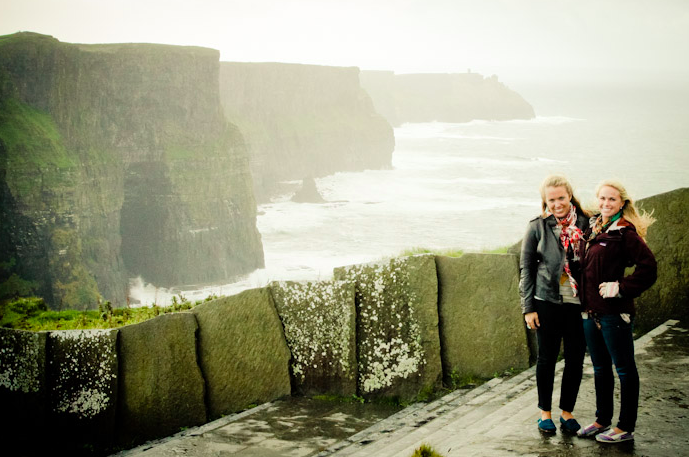We could have passed for locals; a family of five with traces of Irish Catholic decent sketched into our skin tones, facial features, and stature. So why did I feel like an imposture? There, on a dream vacay, we were traveling as Americans who’d done something more than slip away from the rigors of Catholicism. By pulling our children out of private Catholic schools, and consciously stepping away from the church, we actually rejected Catholicism — the very foundation of society in Ireland.
As we speared around the crumbling abbeys and castle ruins amidst a clichéd green countryside, I was hard pressed to imagine more subservient subjects than the Irish. St. Patrick brought Catholicism to Ireland in 433, and even King Henry’s Reformation couldn’t break their loyalty. The Republic of Ireland, in its many incarnations, reliably took its queues on society, morality, and immortality from Rome.
Abortion, in particular, has been a felony in Ireland since 1861 when an Act of Parliament (The Offences against the Person Act) made procuring a miscarriage a criminal offence subject to penal servitude for life. Sound medieval? Here’s some context.
The Great Famine struck Ireland in 1845 and is strictly responsible for the law. Seven years of mass starvation and disease resulted in over 1 million deaths, and the subsequent migration to other countries resulted in a 20-25% decline in population for which the Emerald Isle never recovered. The migrant crisis not only displaced Irish nationals, but also exposed those living abroad to new influences. Settling in other countries would reshape primordial ideas about marriage and family.
While there are 4.6 million Irish Catholics in Ireland today, they have a large diaspora which includes nearly 12 million Americans. We’re a fair, blue eyed, and fierce lot who’ve taken the Irish culture, tradition, and, of course, Catholic way of life to the world.
Pope Paul VI’s “Humanae Vitae” (Of Human Life) was a circular letter that decried artificial birth control a mortal sin, and intended to inform and instruct attitudes about contraception to a now global organization. By 1968, the incriminating date of this encyclical, two-in-three married Catholic women were already using birth control, and suggesting that family planning was akin to ‘turning away from God’ didn’t jive with the vast majority of now working women around the world. It can fairly be said that membership in the Roman Catholic Church began its decline in the 20th century.
She's merely one of many Irish nationals living abroad today, and by happy coincidence was seated next to me on the plane. Irish expatriates who’ve lived abroad for less than 18 months can vote, and on May 25, 2018 an estimated 40,000+ expatriates were called home to do just that. The Abortion Rights Campaign (ARC) encouraged Irish citizens to return #Home to Vote and repeal Ireland's abortion ban in a historic referendum to the Constitution’s Eighth Amendment. Inspired by Ireland's vote to legalize same-sex marriage, which brought thousands of Irish citizens home in 2012, the ARC in this case cited the 3,500 women — who travel back and forth to England for abortion care annually — as inspiration for their cause.
via ARC
In 1983, Ireland attempted to humanize their abortion law by inserting a subsection into the Eighth Amendment of its Constitution which expanded to protect the right to life of the unborn — and the mother. While abortion was already illegal, subject to criminal penalty in Ireland since 1861, this Eighth Amendment ensured that judicial interpretation and legislation would be censured to allow abortion in circumstances where the life of a pregnant woman was at risk. Approved by referendum on 7 September 1983, and signed into law later that year, a woman and her fetus now had an equal right to life.
Irish abortion law reached a tipping point in 2012 with the death of Savita Halappanavar, an Indian woman living in Ireland, who’d been denied an abortion while suffering a spontaneous, though incomplete miscarriage. Medical staff at the University Hospital Galway denied her request for an abortion on the grounds that it would be illegal under Irish law. A septic miscarriage led to her subsequent death, and served as a rallying cry for efforts to repeal and redefine the Eighth Amendment of the Constitution of Ireland.
Coincidently, it was just weeks ahead of this historic referendum vote that we’d embarked to our ancestral homeland. As we settled into the Trans-Atlantic flight, the woman seated next to me was on quite another errand. Her experience as an expat, and particularly as a single parent of two daughters, had caused her to rethink her Catholic troth as she flew toward Ireland for equality.
As we settled into our long journey over the Atlantic, my imposture syndrome lessened with this realization: If I wasn’t a part of this particular movement, I was most certainly a part of the moment. Women throughout history have fought against the church, state, and laws for something science and religion promised but never delivered — freedom from the physical body. While contraception has historically been a matter of state, it was the women of Ireland that came forward in 2018 to challenge a parochial tradition with a personal approach to politics.

via Instagram
Historically, the Republic of Ireland has outsourced most of its education and social welfare system to the Catholic Church. Convents, in particular, received subsidies from the Irish state and local taxes to run schools and orphanages. A spirit of prejudice against unwed mothers was promulgated from the pulpits of the Catholic Church, and systemically fed the toxic culture of shame with resources which created Maternity Homes.
The “Mass Grave Scandal” was making headlines while we were there. The Bon Secours Mother and Baby Home, in particular, operated in Tuam, County Galway, Ireland from 1926 - 1961. Owned and operated by the Bon Secours Sisters, a religious order of Roman Catholic nuns, they were also administrators at the local Grove Hospital in town. When unwed pregnant women arrived at the Grove Hospital for care, they were refused by the nuns who summarily sent them on to their Bon Secours Mother and Baby Home. The mothers however were required to stay inside the Home for one year following their delivery — as unpaid and indentured servants to the nuns — for which the County Council paid the nuns £1 per week for every mother and child in the home.
While “The Home” has been closed for 50+ years, a news story by a local journalist in Tuam recently discovered over 1,000+ newborns may have been illegally sold into adoption without their parent’s consent. Furthermore, a review of county records revealed that the most commonly recorded causes of death among the infants were congenital debilities, infectious diseases, and malnutrition. Nearly 800 children and infants had died at the home, and were laid to rest in an underground albeit abandoned sewer.
The Irish government is currently excavating the site to exhume the bodies, and will conduct forensic DNA testing on all the remains. At an estimated cost of €6-13 million, modern Ireland portends to atone and properly inter those who deceased and were otherwise forgotten at “The Home.” Pope Francis called it a “shameful chapter of recent Irish history,” and urged the Irish Church to make reparations to the home’s survivors for its role. The declination, however, fails to account for the many hundreds of complaints the Vatican received, and was accused of covering up, of the systemic child abuse in schools, orphanages, and churches throughout all of Ireland.
Headlines about catholic clergy, sexual abuse, and coverups began surfacing globally in the late 1980’s, and have resulted in thousands of accusations, many hundred convictions, and an estimated $5 billion in settlements to victims of sexual violence throughout the world. In the early hours of 2018, Pope Francis actually accused some of the victims, pertaining to a case of Chili, of fabricating allegations of abuse. But by April he was apologizing for this "tragic error," and by August — coinciding with the historic referendum — Pope Francis actually recanted his tone entirely and expressed "shame and sorrow" for Catholic Ireland’s tragic history.
On 9 May 2019, the pontiff issued yet another encyclical entitled “Vos estis lux mundi” (You are the light of the world) establishing new procedural norms to combat sexual abuse, and ensure that bishops and religious superiors are held accountable worldwide. This new law is effective for a 3-year experimental period only, and provides for jail time for any public official of the Vatican who fails to report abuse, an unmistakable new course. The painful and bitter experience of the church in Ireland, and the voices of the faithful worldwide, have brought forth a change in religious policy and law. In a world now governed by transparency, the encyclical reads as timely, relevant, and, in the very spirit of the oldest institution on earth, self-preserving.
The U.S. Supreme Court has voted to strike down the landmark Roe v. Wade decision, according to an initial draft majority opinion written by Justice Samuel Alito circulated inside the court.
The draft opinion is a full-throated, unflinching repudiation of the 1973 decision which guaranteed federal constitutional protections of abortion rights.
“We hold that Roe and Casey must be overruled,” Alito writes in an “Opinion of the Court.” “It is time to heed the Constitution and return the issue of abortion to the people’s elected representatives.”
While the court's ruling is expected in June, Abortion Rights supporters are already protesting in cities across the United States today, kicking off what organizers are calling "a summer of rage."
Allowing states to outlaw abortion may be on par with legal racial segregation, yet for a republic — where the people govern themselves via their elected representatives — these matters are designed for discourse and consensus in the public square. The Green Wave in Latin America has seen abortion legalized at 24-weeks in Argentina, Columbia and Mexico making them among the most liberal in the world. Each and all are the result of women organizing, if galvanizing the legislative process of a Republic.
My son and daughter are in college now and our youngest is on the way. Within several years we’ll be empty nesters. That our visit to the motherland coincided with Ireland’s historic referendum reminds me that parenting — like conception, contraception, abortion and birth — shouldn't just be political command and control levers jerked by lawmakers. "The emphasis mustn't be on the right to abortion,'" said Justice Ruth Bader Ginsburg. "It should be on the right to privacy, reproductive control, and a woman's right to choose." In Ireland and elsewhere around the world, a woman's right to choose was due to the work of women themselves. For American women, that work is just beginning.
Archives










